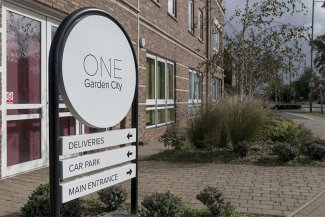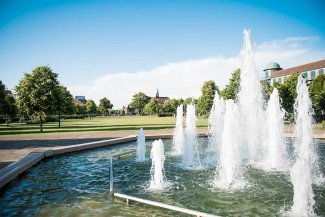Have you ever stopped and wondered just how much leftover food from supermarkets gets thrown away? Every year around 18 million tonnes of food is wasted in the UK, with 12 million tonnes being waste from suppliers and retailers. But what’s being done to tackle it?
Across the UK there are groups trying reduce this food waste. Letchworth has one of these groups and it’s called the Best Before Café. It operates every Wednesday from Mrs Howard Memorial Hall from 10am-1pm.
There are three hourly slots; 10-11, 11-12, 12-1pm and people are encouraged to turn up and pick up food that supermarkets can no longer sell and pay what they feel it is worth.
The Best Before Café, with the help of a grant from the Foundation, has been running since July this year and I thought I’d join in with an early morning collection and find out more about it from the volunteers managing operations.
Early bird catches the Warburtons
I agree to meet one of the volunteers, Ellie, at the Tesco by Hitchin Station. This store, alongside other local supermarkets, including Lidl, have agreed to donate their food that is beyond its best before date.
It’s 8:20am, commuters are heading to the station and a large Tesco truck is unpacking fresh goods. When I arrive, Ellie is already talking to Hayley manager of the store. We pick-up a good number of loaves of bread and some bottles of sparkling water that can’t be sold.
Ellie has already been busy and picked up some bread from Hitchin-based bakers, Quotidian. I ask her if word of mouth about the Café is spreading among retailers?
“I believe it is. From their perspective there is some good PR to gain, as well as reducing their food waste. It’s a win/win. We’re really glad that Waitrose in Hitchin will be joining in in October”.
As well as an early Wednesday pick-up, other volunteers take in food on Tuesday eve. Once it’s all collected, we head over to see Suzy. Suzy is one of the leads of the Best Before Café and every Tuesday night sorts through all the produce received, weighs it and splits it in to three so that there is a good range of food available for each time slot.
On this particular week, there’s a glut of blueberries being sorted and even, incredibly, some Easter eggs! Other produce to be in the mix include lettuce, potatoes, pastries, aubergines, spring onions, bananas, soup sachets. It’s quite a sight to see how much food there actually is available.
So where did the idea for the Best Before Café come from?
“Some of us are also involved in the Letchworth Foodbank and wondered how we could add fresh food to the people who needed Foodbank parcels ”, Suzy explained.
“We’d heard of a pay-as-you-feel café in Watford. We went to see how the Watford operation worked in May this year and saw no reason why it couldn’t work in Letchworth. The model is simple and we used The Real Junk Food Project guidelines to set it up. The Real Junk Food Project champions feeding people not landfill. The project is all about reducing food waste. This means that the community can join in becoming a part of the solution to a national issue. It’s also a positive spin on two problems Food Waste and Food Poverty. It’s this ethos that makes everyone want to join in. There are around 11 of us volunteers, but more people are coming forward to help out every week”.
To the Mrs Howard Memorial (Food) Hall
Having filled-up a camper van with the goods, we make our way over to Mrs Howard Memorial Hall where the rest of the volunteers are gathered to start arranging the room and putting out the first round of produce.
Two of those volunteers were Kara and Isobel. I asked them why they volunteered here?
“I just like the feeling of giving back.” Kara replies, “I dislike food waste, so feel really strongly about the good that the café can do prevent this“.
“There’s also the strong feeling of community that comes out here. People from all walks of life come along, have a chat and create a nice relaxed atmosphere.”
Isobel adds, “It makes you appreciate what you have and also, how we can help solve problems when community and businesses work together”.
At this point, the initial burst of visitors have entered the hall and are taking whatever catches their eye. While people look over the produce, they are also able to order tea, coffee or squash and take a seat around the room. It quickly fills up. I’m placed on tea duty, delivering cuppas to those dotted around the room or giving a loud shout when my patron can’t be easily identified.
What strikes me about the café is that it feels like a family event. Those coming to pick-up food all seem familiar to each other and the volunteers too. People catch-up, share recipes of things they cooked using last week’s haul, it’s a wonderfully warm environment. People even come in and donate food from their own gardens, a nice batch of tomatoes and apples make their way to the stalls.
The 10-11 slot finishes, the next one begins. More people come through the doors, or those who just missed the first slot stick around as the new batch of food goes on display. This repeats on the final 12-1pm slot. The hall remains busy throughout and I count over 140 differing orders for hot drinks have been fulfilled during that time! The donation buckets also emit a constant “chink” as people drop in their donations for the food they’ve bought and eaten.
I catch-up with Suzy towards the end of the session and ask her if she thought it would be this popular or successful?
“I didn’t know what to expect really. People had said to be happy if we got 30 people through the doors and made £50 in donations. Turns out we’re seeing an average of around 100-130 people each week and donations are healthy. We publish them on Facebook each week”.
Talking of social media, I ask Suzy about the reaction on Facebook and Instagram, it’s certainly got lots of momentum behind it, is this a surprise?
“It is and it isn’t. We’re surprised because none of us are experienced in setting up a café and it’s been relatively easy. We’ve been lucky, we have lovely customers that understand what we are doing and why. We were surprised that the local community rallied round, but perhaps shouldn’t have been. People want to support positive community actions, especially in Letchworth with its history of sustainability and its ‘green’ credentials. Social media helps us all shout about the great things people do, be it donating their time, food, surplus allotment veg, or baking cakes for us and sharing their recipes. You’ve seen today how nearly all the produce is gone *all that was left was a jar of baby food and some spring onions* and we want to thank people for their support and Facebook is a great medium to do that”.
Before I leave, I ask her about the longer term plans. The Heritage Foundation grant covers their rent in Mrs Howard Memorial Hall for the next few months, what are the next steps?
“We’re moving in to the larger hall soon, with a kitchen, which means we can perhaps offer hot snacks alongside tea and coffee. The sky really is the limit with this project, it can connect people to each other and services as well as save on food waste”.
That certainly appears to be the case. I enjoyed my day helping out the Best Before Café team and will look to do more in future. If you want to help or find out more, email bestbeforecafe@gmail.com or find them on Facebook and Instagram.


